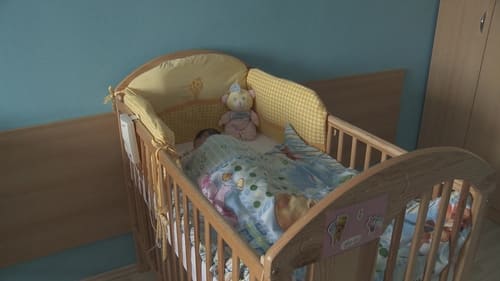
Screenplay

Idea
In her most recent film, Linda Kallistová Jablonská observes three girls growing up in a residential facility in Počátky, Czech Republic, over the course of ten years. She explores their dreams about liberty, the reality they must face as well as their ideas about their own future families. The sequel to her first longitudinal documentary about Adéla, Denisa and Pavla captures the rocky road to independence after leaving the facility, their reconciliation with the past, job search, new relationships, small joys and big disappointments. Not only does the director draw an empathic portrait of three young girls with no-one to rely on but themselves; she also explores the ways in which public institutions form young people’s attitudes to life.

Screenplay
In her most recent film, Linda Kallistová Jablonská observes three girls growing up in a residential facility in Počátky, Czech Republic, over the course of ten years. She explores their dreams about liberty, the reality they must face as well as their ideas about their own future families. The sequel to her first longitudinal documentary about Adéla, Denisa and Pavla captures the rocky road to independence after leaving the facility, their reconciliation with the past, job search, new relationships, small joys and big disappointments. Not only does the director draw an empathic portrait of three young girls with no-one to rely on but themselves; she also explores the ways in which public institutions form young people’s attitudes to life.

Director

Director
In her most recent film, Linda Kallistová Jablonská observes three girls growing up in a residential facility in Počátky, Czech Republic, over the course of ten years. She explores their dreams about liberty, the reality they must face as well as their ideas about their own future families. The sequel to her first longitudinal documentary about Adéla, Denisa and Pavla captures the rocky road to independence after leaving the facility, their reconciliation with the past, job search, new relationships, small joys and big disappointments. Not only does the director draw an empathic portrait of three young girls with no-one to rely on but themselves; she also explores the ways in which public institutions form young people’s attitudes to life.

Screenplay
1,200 kilometres of snowy landscape to be covered in 12 days. These are the conditions for the Finnmarksløpet sled dog race and Czech husky breeder Jana Henychová is set to participate again.

Director
1,200 kilometres of snowy landscape to be covered in 12 days. These are the conditions for the Finnmarksløpet sled dog race and Czech husky breeder Jana Henychová is set to participate again.

Screenplay

Idea

Director of Photography

Director

Screenplay
Documentary.In its catalogue, a Czech travel agency offers a "journey into the unknown", a tour of North Korea. That spring was the second time since 1990 that a group of Czech tourists set foot in the DPRK. The film follows twenty-seven Czechs who have decided to spend approximately 2,600 Euros on a sightseeing tour of a country which cultivates a cult of personality, maintains concentration camps for its citizens and doesn't hide its development of nuclear weapons. Foreign visitors are only allowed a view of a carefully prepared illusion, thoroughly supervised by "guides". What is more, the North Korean system is starkly reminiscent of our own past. Which emotions do our travellers experience: sympathy, nostalgia or, in contrast, happiness that "we already have this behind us"? How does a Czech person, after being accustomed to eighteen years of freedom and democracy, come to terms with the directives and restrictions of a totalitarian system?

Camera Operator
Documentary.In its catalogue, a Czech travel agency offers a "journey into the unknown", a tour of North Korea. That spring was the second time since 1990 that a group of Czech tourists set foot in the DPRK. The film follows twenty-seven Czechs who have decided to spend approximately 2,600 Euros on a sightseeing tour of a country which cultivates a cult of personality, maintains concentration camps for its citizens and doesn't hide its development of nuclear weapons. Foreign visitors are only allowed a view of a carefully prepared illusion, thoroughly supervised by "guides". What is more, the North Korean system is starkly reminiscent of our own past. Which emotions do our travellers experience: sympathy, nostalgia or, in contrast, happiness that "we already have this behind us"? How does a Czech person, after being accustomed to eighteen years of freedom and democracy, come to terms with the directives and restrictions of a totalitarian system?

Director
Documentary.In its catalogue, a Czech travel agency offers a "journey into the unknown", a tour of North Korea. That spring was the second time since 1990 that a group of Czech tourists set foot in the DPRK. The film follows twenty-seven Czechs who have decided to spend approximately 2,600 Euros on a sightseeing tour of a country which cultivates a cult of personality, maintains concentration camps for its citizens and doesn't hide its development of nuclear weapons. Foreign visitors are only allowed a view of a carefully prepared illusion, thoroughly supervised by "guides". What is more, the North Korean system is starkly reminiscent of our own past. Which emotions do our travellers experience: sympathy, nostalgia or, in contrast, happiness that "we already have this behind us"? How does a Czech person, after being accustomed to eighteen years of freedom and democracy, come to terms with the directives and restrictions of a totalitarian system?

Stage mime Antoine Moreau is compelled by the Gestapo to put on a performance for the children of Terezin, a "model" concentration camp, to convince the Red Cross observers that the camp is truly what it seems. Reluctant at first, Moreau slowly learns the true nature of the camp, including the meaning of the "transports" on which people leave. With a world-class orchestra (made up of people interned in the camp) and a cast of children, Moreau stages a show to end all shows.








